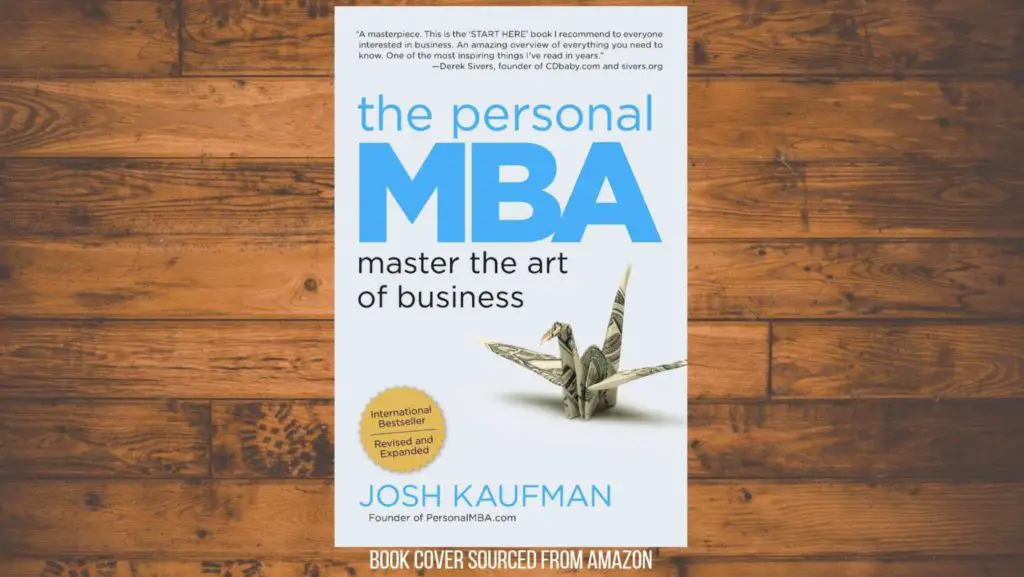This post may contain affiliate links, which means I’ll receive a commission if you purchase through my links, at no extra cost to you. Please read full disclosure for more information.
ABOUT
- Title: The Personal MBA
- Sub-title: Master the Art of Business
- Author: Josh Kaufman
- About the author: Josh Kaufman is a bestselling author with three books: The Personal MBA, The First 20 Hours, and How to Fight Hydra. He skipped business school, but not business education. He read and researched deeply on the aspects of business before launching his Personal MBA blog. Before working on the Personal MBA full-time, he had a great start to a corporate career with several years at P&G.
- Pages: 464
- Published: 2012
- Link to book
HIGH-LEVEL SUMMARY
The Personal MBA is your business handbook that can act as an alternative to an MBA.
Author Josh Kaufman talks about how many people assume that they need to attend business school to learn how to build a successful business or advance their career. He points out why this isn’t the case.
His goal with this book is to give a comprehensive overview of the foundational business concepts you can use to get things done, whether that is running your own business or improving your skills if you are an employee of a business.
In fact, he explores 248 concepts across all areas of business.
Topics covered in the book include:
- Value creation
- Marketing
- Sales
- Value delivery
- Finance
- The human mind and emotions
- How to work with others
- How to understand, analyze, and improve systems
On top of that, Josh dives into the MBA and discusses the pros and cons to help provide you with the blunt reality of business schools.
Rather than spending hundreds of thousands of dollars to learn complex financial models and PowerPoint building, you can educate yourself, gain real-world experience, and be just as good or better. It all depends on yours goals and situation.
RECOMMENDATION
This is one of the most comprehensive books I have read on business. The Personal MBA touched on nearly all the essential things I learned in the school of business during my undergraduate years.
I would recommend this as one of the first books you should read if you are brand new to business and/or are considering an MBA.
I would also recommend this to those with business degrees who are considering an MBA. MBAs are glamourous and I, admittedly, have gone back and forth on whether or not I should pursue an MBA. This book helped provide clarity on that. If you are seeking clarity, The Personal MBA may help you find it.
In addition to that clarity, your reading will provide you with new business knowledge or a refreshment on previous knowledge. If you aspire to be an entrepreneur, you will find great value in this book. And if you currently work for a company, the principles that Josh Kaufman lays out will help you perform your job better.
Personally, I will keep this book close for whenever I need a refresher. The book covers 248 topics, which I don’t expect myself to fully memorize, but still want access to.
Check out these related posts next!
- Want to Become an Entrepreneur? Be an Intrapreneur First
- Book Review: Your Next Five Moves by Patrick Bet-David
- The Single Best Way to Improve Yourself and Grow in Your Career
- How to Learn More and Learn Faster: 20 Things to Do
TOP 30 TAKEAWAYS
In no particular order
1. Many people assume that they need to attend business school to learn how to build a successful business or advance in their career. That’s simply not true.
2. Knowing what’s critically important (the critical few) in every business is the first step in making good business decisions. Identify the key performance indicators. Deconstruct complex systems down into the simple systems that build it.
3. Every business is fundamentally a collection of five interdependent processes: value creation, marketing, sales, value delivery, and finance. If you want to improve your value as a businessperson, focus on improving skills directly related to these five parts of every business.
4. MBA programs have become so expensive you must effectively mortgage your life to pay the price of admission. Business schools don’t create successful people. They simply accept them, then take credit for their success.
5. The one significant benefit that business schools do provide is better access to Fortune 500 recruiters, consulting firms, large accounting firms, and investment banks via on-campus recruiting and alumni networks. If you’re more interested in working for yourself, getting an MBA is a waste of time and money.
6. Every business is limited by the size and quality of the market it looks to serve. Market research is the equivalent of “looking before you leap.”
7. Human beings have five Core Human Drives that influence our decisions and actions: the drive to acquire, the drive to bond, the drive to learn, the drive to defend, the drive to feel.
8. 10 ways to evaluate a market: 1) Urgency 2) Market size 3) Pricing potential 4) Cost of customer acquisition 5) Cost of value delivery 6) Uniqueness of offer 7) Speed to market 8) Up-front investment 9) Upsell potential 10) Evergreen potential.
9. 12 standard forms of value: 1) Product 2) Service 3) Shared resource 4) Subscription 5) Resale 6) Lease 7) Agency 8) Audience aggregation 9) Loan 10) Option 11) Insurance 12) Capital.
10. The Iteration Cycle is a process you can use to make anything better over time. Your primary goal is to work through each Iteration Cycle as quickly as possible. Getting useful Feedback from your potential customers is the core of the Iteration Cycle.
11. There are nine common Economic Values that people typically consider when evaluating a potential purchase: 1) Efficacy 2) Speed 3) Reliability 4) Ease of use 5) Flexibility 6) Status 7) Aesthetic appeal 8) Emotion 9) Cost.
12. Desire. Your job as a marketer isn’t to convince people to want what you’re offering: it’s to help your prospects convince themselves that what you’re offering will help them get what they really want.
13. There are four ways to support a price on something of value: (1) replacement cost, (2) market comparison, (3) discounted cash flow/net present value, and (4) value comparison.
14. Selling anything is largely the process of identifying and eliminating Barriers to Purchase: risks, unknowns, and concerns that prevent your prospects from buying what you offer.
15. Value Delivery involves everything necessary to ensure that every paying customer is a happy customer: order processing, inventory management, delivery/fulfillment, troubleshooting, customer support, etc.
16. Tracing the steps or transformations your offer goes through from the beginning to the end is an extremely enlightening process that can show you just how efficient your Value Delivery process is. Diagram it and, in general, try to make your Value Stream as small and efficient as possible.
17. A System is a process made explicit and repeatable—a series of steps that has been formalized in some way. The primary benefit of creating a system is that you can examine the process and make improvements.
18. Finance is the art and science of watching the money flowing into and out of a business, deciding how to allocate it, and determining whether or not what you’re doing is producing the results you want.
19. 4 methods to increase revenue: 1) Increase the number of customers you serve 2) Increase the average size of each transaction by selling more 3) Increase the frequency of transactions per customer 4) Raise your prices.
20. Lifetime Value is the total value of a customer’s business over the lifetime of their relationship with your company. By understanding how much your average customer purchases and how long they tend to buy from you, you can place a tangible value on each new customer.
21. Compounding is the Accumulation of gains over time. If you reinvest the revenue your business generates and your business is growing rapidly, you can multiply your original investment many times over.
22. Bootstrapping is the art of building and operating a business without Funding. Bootstrapping allows you to grow your business while maintaining 100 percent control over the business’s operations. Bootstrap as far as you can go.
23. Understanding how we (humans) take in information, how we make decisions, and how we decide what to do or what not to do is critically important if you want to create and sustain a successful business venture.
24. Neurologically, it’s impossible for your brain to multitask. If you constantly switch the focus of your Attention, you’re forcing your brain to spend time and effort thrashing, loading and reloading contexts over and over again. This Cognitive Switching Penalty is a Friction cost and is why Monoidealism is so efficient.
25. Excessive Self-Regard Tendency is the natural tendency to overestimate your own abilities, particularly if you have little experience with the matter at hand. Cultivate relationships with people who aren’t afraid to tell you when you are wrong or on the wrong path.
26. The Hedonic Treadmill is pursuing pleasurable things because we think they’ll make us happy. When we finally achieve or acquire what we’re seeking, we adapt to our success in a very short period of time, and our success no longer gives us pleasure.
27. Understanding your Locus of Control is being able to separate what you can control (or strongly influence) from what you can’t. Trying to control things that out of your control will lead to eternal frustration.
28. Personal R&D is investing in improving your personal skills and capabilities, which can enrich your life and open doors. Save money that can be be used—guilt free—for purchasing books, taking courses, acquiring equipment, attending conferences, etc.
29. Here’s Gall’s Law: all complex systems that work evolved from simpler systems that worked. If you want to build a system that works, the best approach is to build a simple system that meets the Environment’s current selection tests first, then improve it over time.
30. Analyzing systems. Deconstruction is the process of separating complex systems into the smallest possible subsystems in order to understand how things work. If you can identify simpler subsystems and focus on understanding how they work and how they fit together, you can eventually understand how the entire system works.
WHAT I LIKED

Extremely comprehensive
As I said in my recommendation, this is one of the most comprehensive books on business I have ever read.
Reading through it gave me flashbacks of my entire undergraduate degree in one week. The book will start by discussing the author’s background and dive into the idea and facets of business schools.
The remaining sections of the book will discuss everything from value creation to marketing, to finance, to the human mind, to understanding and optimizing systems.
Aside from learning concrete business knowledge, you will learn about the psychological aspect of business and the soft skills you need to be successful.
These soft skills include many interpersonal skills such as decision making, goal-setting, habit building, internal locus of control, communication, leadership, honesty, resilience, and more.
Stays high-level and not too far into the weeds
Although The Personal MBA covers a lot, it has the right balance of staying high-level and not getting too far into the weeds. Each of the 248 topics covered could have been expanded into 10x what the book gave us.
I believe that would have taken away from the book. Staying high level gives the reader enough information to have a basic understanding of what any topic is and how it relates to the rest of business.
Provides explanation and analyses on MBAs
I enjoyed the first part of the book that discussed MBAs.
Kaufman walks you through the question on if you should go to business school or not. He explains 3 problems with business schools, the financial and career reality, what an MBA will actually get you, and the single benefit of business schools.
Seeing the perspective from the author and the evidence the author uses is a perspective you don’t see too often. Universities and companies are constantly advocating for individuals to pursue an MBA. They are businesses themselves, so this makes sense.
Reading information from the other side of that stance can help you find clarity on if an MBA is for you or not.
BENEFITS TO YOUR LIFE AND CAREER

Find clarity on your decision to pursue an MBA or not
Pursuing an MBA is a massive decision, both professionally and financially. Before taking the leap, you must have absolute clarity on if it is the right choice for you. I have debated far too much on this personally.
I’ve tried to weigh the pros and cons of potential career advancement and networking versus certain debt and two years of no income. The Personal MBA helped me find clarity and it may help you as well.
If this book can make any difference in helping you make the right decision, that alone can provide life-altering and career-altering benefits.
Learn the fundamentals to start a business
This book will help you learn the fundamentals of business. This is essential to both those new to business as well as the veterans. Sometimes, those with years of experience have forgotten the fundamentals.
Having this solid foundation of knowledge is essential to succeeding. You’ll benefit from keeping this book close. If you are struggling with sales, review the chapter on sales. If you are trying to optimize your systems, review the chapters on analyzing and improving systems.
Review the fundamentals to identify areas of improvement for your current employer
The Personal MBA will not only benefit entrepreneurs. This book will help you if you currently work for a corporation. If you work on the Strategy team at your company, being well-versed in the 248 topics of this book will surely help you perform better.
15 ACTIONS YOU SHOULD TAKE
1. Identify the fundamentals and principles of a business and master them.
2. Learn how people think and behave. Learn how humans make decisions, act on those decisions, and communicate with others.
3. If you are interested in business school, thoroughly reflect on why. Do you want to be a consultant, banker, accountant, or a Fortune 500 manager? Or do you want to learn business to work for yourself. If it is the latter, business school is not necessary.
4. When starting a business, think of how you can add value to others, preferably many others. Think of things that cause people a hassle. Where there’s a hassle, there’s a business opportunity. People are almost always willing to pay for things that they believe are too much of a pain to take care of themselves.
5. Build economically valuable skills. These are skills or knowledge that help you create value, market, sell, deliver value, or manage finances.
6. When any two markets are equally attractive in other respects, you’re better off choosing to enter the one with competition. You know there is a market there.
7. When selling, focus on eliminating barriers to purchase and risk reversal. You want to eliminate any reason a customer could have to not buy from you.
8. Look for inspiration to improve your Value Stream and systems by studying the Toyota Production System (TPS). Always make improvements, even if each one is only a slight improvement.
9. Prioritize nutrition, exercise, and rest. They will provide you with energy to pursue your business endeavors.
10. Implement monoidealism rather than multitasking. With monoidealism, you can enter a “flow” state and avoid the cognitive switching penalty.
11. Create well-formed goals using the PICS format: Positive, Immediate, Concrete, Specific.
12. Conducting a “root cause analysis” is a useful way to discover the motivations behind our desires. Applying the Five-Fold Why: whenever you set a Goal or objective, ask yourself why you want it. When your mind provides an answer, ask “why?” again, until you get to the root.
13. Get feedback from others who are willing to disagree with you. The feedback will be helpful and honesty will help you overcome cognitive biases and blindness.
14. Save a percentage of your income each month for Personal Research and Development (R&D). Invest in improving your personal skills and capabilities.
15. If you want to make others feel Important and safe around you, always remember to treat people with appreciation, courtesy, and respect.
RESOURCES
The Personal MBA can be found on Amazon at this link here if you are interested in reading.



